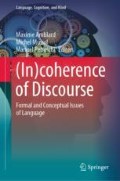Abstract
This article adopts the hypothesis that language impairment in schizophrenia is more a sign of an interactional deficit than of a central disorder at the semantic level. Our aim is to better understand the rationality of the patient by significantly modifying how we conceptualize the mind, and to revisit the concept of belief. Our aim is to elucidate the degree to which this health dysfunction constitutes a mental disorder. We will do this by adopting an anthropological holism of the mental (of mind) such as the view Wittgenstein defended with his concept of language-games. This theory enables us to reconcile the two concepts of disordered language and ‘form of life’, with the particular form of life being schizophrenia. We center our argument on Robert Brandom’s expressivist, rationalist-pragmatist conception of mind and language.
Access this chapter
Tax calculation will be finalised at checkout
Purchases are for personal use only
Notes
- 1.
The form of life concept is a set of practices that give particular characteristics to the community, symptomatic of beliefs, and ways of acting.
- 2.
A pertinent question is whether schizophrenia in and of itself can be characterized as a particular form of life, given that those of us who do not suffer from schizophrenia can experience dissonance in moments throughout our ordinary lives (normal forms of life), particularly in our relationships with other people. But these moments do not last. Schizophrenia, however, by its nature forces us to do what we are not able to do naturally. Indeed, according to Conant (1990): “Trying to deviate from one’s life form is not, (…), a task for which one is obviously adapted. We might as well consider leaving the human race and trying to get rid of the natural reactions and propensities that we have in common with others and that allow us to live with others.”
- 3.
This is how E. Anscombe defines intentional action (1957, §47).
- 4.
Our intention is not to describe a causal relationship but a logical one. Similarly, the hypothesis we support is this: we can partially describe schizophrenia as the result of a mixture of categories (error). It is not a causal relationship between the disease and the mixture, it is a logical link. What we are trying to do in this article is to show that there is an interest in establishing a description of schizophrenia as logically related to a language game and a mixture of language categories. The neurologist, on the other hand, will be interested in cause-and-effect relationships. Our purpose is to provide a philosophical framework for a non-causal approach to schizophrenia, by specifying how we can conceive of problems of schizophrenic interactions.
- 5.
“Here the term ‘language–game’ is meant to bring into prominence the fact that the speaking of language is part of an activity, or of a form of life” (Wittgenstein 2009, §45).
- 6.
Delusion (DSM III-R) and DSM IV-TR (2000): “Personal belief based on false induction of external reality”.
- 7.
Les institutions du sens, Paris: Editions de minuit, 1996, p. 333.
References
Amblard, M., Musiol, M., & Rebuschi, M. (2011). Une analyse basée sur la S-DRT pour la modélisation de dialogues pathologiques. Actes de la 18e conférence sur le Traitement Automatique des Langues Naturelles-TALN 2011, France, Montpellier.
Anscombe, E. (1957). Intention. Oxford, Basil Blackwell.
Austin, J. L. (1962). How to do Things with Words. Oxford, Clarendon Press.
Brandom, R. (2001). Articulating Reasons. Harvard University Press.
Conant, J. (1990). Introduction. In Putnam, H. Realism with a Human Face. Harvard University Press.
Descombes, V. (1996). Les institutions du sens. Paris, Editions de minuit.
Descombes, V. (2003). Comment savoir ce que je fais ? Philosophie, 76, 15-32.
Ehrenberg, A. (2004). Remarques pour éclaircir le concept de santé mentale. Point de vue. Revue française des affaires sociales, 1, 77-88.
Fernandez-Zoïla, A. (2000). Du délire-discours à l'hallucination ou de la clinique à la psychopathologie. L'Évolution Psychiatrique, 65, 375-385. https://doi.org/10.1016/S0014-3855(00)80012-2.
Franck, N. (2016). La schizophrénie. Paris, Odile Jacob.
Gimenez, G. (2010). Halluciner, percevoir l’impensé. Paris, de Boeck.
Lara, P. de (2005). Le rite et la raison. Paris, Ellipses.
Maleval, J.-C. (2011). Logique du délire. Presses universitaires de Rennes.
Pachoud, B. (1996). Les troubles de la compétence interactionnelle dans la schizophrénie. In I. Joseph & J. Proust (eds.) La folie dans la place : Pathologies de l’interaction. Paris, Éditions de l’EHESS, 211-230.
Rebuschi, M., Amblard, M., & Musiol M. (2013). Schizophrénie, logicité et perspective en première personne. L'Évolution Psychiatrique, 78, 27-141.
Ryle, G. (1949). The Concept of Mind. University of Chicago Press.
Sass, L. (1994). Paradoxes of delusion. Cornell University Press.
Tomasello, M. (2004). Aux origines de la cognition humaine. Paris, Retz.
Trognon, A., Musiol, M. (1996). L’accomplissement interactionnel du trouble schizophrénique. In I. Joseph & J. Proust (eds.) La folie dans la place : Pathologies de l’interaction. Paris, Éditions de l’EHESS, 179-209.
Wittgenstein, L. (2009) [1953]. Philosophical Investigations. Oxford, Blackwell.
Wittgenstein, L. (1969). On certainty. Oxford, Basil Blackwell.
Wittgenstein, L. (1989) [1980]. Bemerkungen über die Philosophie der Psychologie. Trad.fr. G. Grael (1989), Remarques sur la Philosophie de la Psychologie. Mauvezin, TER.
Author information
Authors and Affiliations
Corresponding author
Editor information
Editors and Affiliations
Rights and permissions
Copyright information
© 2021 The Author(s), under exclusive license to Springer Nature Switzerland AG
About this chapter
Cite this chapter
Louis, F. (2021). Incoherent Discourse in Schizophrenia: An Anthropological Approach to the Mind. In: Amblard, M., Musiol, M., Rebuschi, M. (eds) (In)coherence of Discourse. Language, Cognition, and Mind, vol 10. Springer, Cham. https://doi.org/10.1007/978-3-030-71434-5_8
Download citation
DOI: https://doi.org/10.1007/978-3-030-71434-5_8
Published:
Publisher Name: Springer, Cham
Print ISBN: 978-3-030-71433-8
Online ISBN: 978-3-030-71434-5
eBook Packages: Religion and PhilosophyPhilosophy and Religion (R0)

